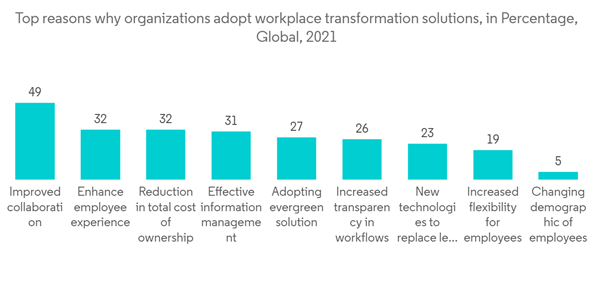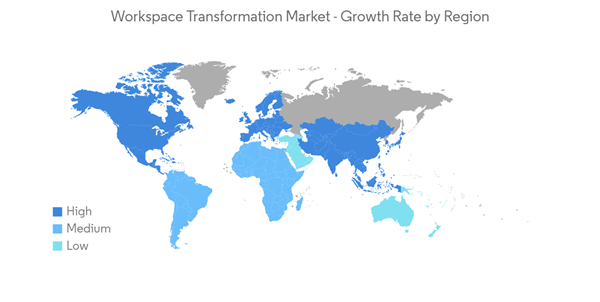The Workspace Transformation Market revenue is expected to grow at a CAGR of 17% over the next five years. The rapid growth in the use of smartphones, tablets, and other smart devices in organizations can be attributed to market growth.
In February 2022, Progressive Infotech, a digital workplace service transformation company, implemented Workelevate, a digital workspace service automation platform, to simplify ticket management and elevate the employee experience.
In May 2022, Wipro signed a five-year agreement to transform Sweden-based truck manufacturer Scania’s digital workplace services and support its journey towards sustainable transport solutions.
This product will be delivered within 2 business days.
Key Highlights
- Workspace transformation with the implementation of a cloud-based solution, Artificial Intelligence (AI), the Internet of Things (IoT), and Virtual Reality (VR) would ease accessibility solutions. These technological advancements have provided new opportunities for market players to expand their workforce management portfolio and integrate cloud features.
- The increased need for electronic data across patient outreach and operation channels will move the sector ahead. Healthcare practitioners, for example, may utilize healthcare applications on patients' cell phones to monitor heart rates, blood pressure, and glucose levels. Furthermore, it enhances the patient experience by allowing for improved decision-making and the most effective use of resources and time. These factors will propel market growth over the next five years.
- The growing adoption of enterprise mobility management solutions and the rapid growth of digitalization can contribute to growth in the market. For instance, L&T Technology Services (LTTS) partnered with UK-based cloud, connectivity, and communications services provider, Exponential-e to jointly offer workplace transformation solutions to customers working in the post-COVID environment. These benefits will supplement the market's growth over the next five years.
- The COVID-19 pandemic situation made employees shift to remote working and overturning technologies to bring into the digital workplace to maintain business continuity. Enterprises have discovered new methods of delivering training and encouraging team bonding and collaborations with the help of digital workspaces. Furthermore, with the ease of the pandemic, several organizations have made long-term investments in workplace transformation for the hybrid work model, necessitating the deployment of cloud-based solutions to enable remote working with secure access. These factors are predicted to influence market growth over the next five years favorably.
Workspace Transformation Market Trends
New Technological Advancements in the IT Industry are Driving Market Growth
- The digital workplace allows employees to increase transparency, efficiency, and cooperation while helping streamline enterprise operations. With the help of advanced technological developments and the advantages of the digital workplace becoming more evident, enterprises are increasingly allocating higher IT budgets to support digital workplace strategies, which will further create new opportunities for the workspace transformation market.
- Automation, machine learning, artificial intelligence, and virtual reality (VR) are all becoming increasingly common parts of the HR toolkit. Technical infrastructure has also changed in response to virtual, mobile, and hybrid environments.
- According to Infosys, improved productivity is the top reason organizations adopt workplace transformation solutions. A hybrid workforce is driving the growth of the workspace transformation market. A hybrid work model has helped organizations to establish a balance between effective work with reduced stress and less commuting.
- While many organizations require their staff to return to the office, Infosys has implemented a flexible 3- phase work model for its employees. For example, Infosys' new work model allows workers to work in three ways. Employees can come to the workplace twice a week during the first phase at their convenience. They can transfer or migrate to a branch office in the following one. In contrast, the corporation will consider the feedback from both stages to develop its hybrid-work strategy in the final phase.
- Key players in the workspace transformation market are investing in digital tools and technologies and fostering collaborative workplaces that boost productivity. For Instance, Infosys has a long-term strategic partnership with GE Appliance to streamline IT operations effectively. This partnership would help to accelerate their digital and workplace transformation through automation-driven managed IT services support across global command centers, service desks, end-user computing, IT infrastructure, and applications. Such deals, collaborations, and partnerships are expected to drive the market's growth further.
North America Holds a Prominent Share in the Workspace Transformation Market
- North America is expected to hold a significant share of the workspace transformation market. Important factors contributing to the growth of the workplace transformation market include a shift in worker demographics and increased acceptance of business mobility services, which assist in improving staff productivity and minimizing operational expenditures.
- The use of advanced technologies, such as cloud computing, AI, big data and analytics, mobility/social media, cybersecurity, and IoT, led to innovation and transformation, thereby stimulating growth in the business ecosystem of North America. Digital technologies have transformed the legacy approach to business into a modern system.
- For Instance, Cisco launched Webex Suite, which includes several solutions for all collaboration needs like calls, meetings, messaging, polling, and event capabilities. The app features AI that automates tasks and creates more explicit focus with background noise, voice removal, and speech enhancement. IT can manage these devices remotely for asset management, which will drive new growth opportunities for the workspace transformation market.
- The rising digital transformation in this region is leading to increased adoption of workspace transformation. For instance, Accenture announced the acquisition of Workforce Insight, a business management consultancy, to enhance its workforce management capabilities and supports its ability to deliver Human Resources (HR) transformation to its clients. Accenture will expand its planning capabilities and advisory with this acquisition and provide its client's complementary data and analytics technology solutions.
- L&T Technology Services Ltd has expanded its collaboration with Microsoft Corporation and launched its enhanced version of the i-BEMS solution on Microsoft Azure, focusing on creating digital experiences and intelligent space management. Such collaborations and partnerships from the key players in the market are expected to drive the market's growth further.
Workspace Transformation Market Competitor Analysis
The Workspace Transformation market is moderately fragmented due to ongoing partnerships and recent advancements in the market. Some major players in the market studied include Accenture PLC, Intel Corporation, Cisco Systems, IBM Corporation, and Wipro.In February 2022, Progressive Infotech, a digital workplace service transformation company, implemented Workelevate, a digital workspace service automation platform, to simplify ticket management and elevate the employee experience.
In May 2022, Wipro signed a five-year agreement to transform Sweden-based truck manufacturer Scania’s digital workplace services and support its journey towards sustainable transport solutions.
Additional benefits of purchasing the report:
- The market estimate (ME) sheet in Excel format
- 3 months of analyst support
This product will be delivered within 2 business days.
Table of Contents
1 INTRODUCTION
4 MARKET INSIGHTS
5 MARKET DYNAMICS
6 MARKET SEGMENTATION
7 COMPETITIVE LANDSCAPE
Companies Mentioned (Partial List)
A selection of companies mentioned in this report includes, but is not limited to:
- Accenture PLC
- Intel Corporation
- Cisco Systems
- Atos
- IBM Corporation
- Hewlett Packard Enterprise
- Wipro
- Capgemini
- Citrix Systems
- Cognizant Technology Solutions Corporation
- HCL Technologies










